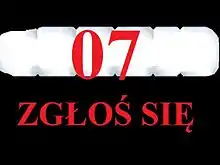| 07 Come In | |
|---|---|
 Title card | |
| Genre | Action, police procedural |
| Based on | Ewa wzywa 07 |
| Written by | Krzysztof Szmagier |
| Directed by |
|
| Starring |
|
| Composer | Włodzimierz Korcz |
| Country of origin | Poland |
| Original language | Polish |
| No. of seasons | 5 |
| No. of episodes | 21 |
| Production | |
| Cinematography |
|
| Editor | Anna Maria Czolnik |
| Running time | 60 minutes |
| Production company | Studio Filmowe Kadr |
| Original release | |
| Release | 25 November 1976 – 25 May 1989 |
07 Come In (Polish: 07 zgłoś się) is a Polish criminal television series broadcast on TVP from 25 November 1976 to 25 May 1989.[1] The series consists of 21 episodes, divided into five seasons, filmed in 1976, 1978, 1981, 1984, and 1987, respectively. It combines elements of action and police procedural genres.
Background
Directed by Krzysztof Szmagier and scored by Wlodzimierz Korcz, the series centers on the investigations of Police Lieutenant Sławomir Borewicz (played by Bronisław Cieślak), who solves a different case in each episode.[2][3] The show was loosely based on the novel series Ewa wzywa 07 (Ewa calls 07).[2] The title of both the novels and the TV series refers to "zero-seven", a police radio call-sign used by Borewicz. The show shared a number of similarities, and one complete storyline, with the comic book series Kapitan Żbik.
Despite being widely considered a work of propaganda aimed at warming the image of the "Citizen's Militia", the series proved highly popular in Poland and even gained a cult following. Critics called it "one of the biggest achievements of Polish crime drama",[4] a "raw and realistic response to James Bond",[5] and "the most popular Polish police series ever".[6]
References
- ↑ Marek Hendrykowski: Porucznik Borewicz jako idol popkultury ("Lieutenamt Borewicz: A Popular Culture Idol"), "Images" 2005, vol. 3, nr 5–6, s. 70–78.
- 1 2 07 zgłoś się at the Telewizja Polska website
- ↑ Krzysztof Szmagier, Komisarz Borewicz. 07 zgłasza się... po latach, 2009, ISBN 978-83-61159-05-6.
- ↑ Sylwia Kucharska; Karol Jachymek. Wrocław i film [Wrocław and Cinema] (in Polish). Wrocław: Sylwia Kucharska. p. 27. ISBN 9788362443321.
- ↑ Anna Żarnowska (2000). Andrzej Szwarc (ed.). Kobieta i kultura czasu wolnego [Woman and the Culture of Spare Time]. Kobieta i kultura czasu wolnego (in Polish). Vol. 7. DiG. pp. 555, 506. ISBN 83-7181-199-3.
- ↑ Ewa Mazierska (2007). Polish Postcommunist Cinema: From Pavement Level. New Studies in European Cinema. Vol. 4. Peter Lang. pp. 299, 44. ISBN 978-3-03910-529-8.
External links
- 07 zgłoś się at IMDb